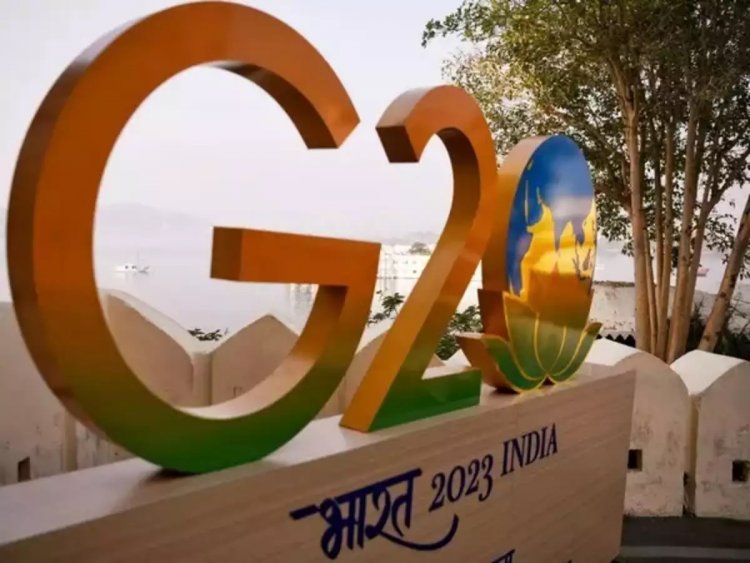The G20 Consensus Challenge: India’s ‘Plan B’
STORIES, ANALYSES, EXPERT VIEWS

The G20 summit is scheduled to be held in Delhi in a little more than six weeks. India has the capability to ensure flawless and successful logistics for the summit. The government has also held numerous meetings in different parts of the country on various subjects and themes covered by the G20.
However, negotiators are still struggling with finding an acceptable text.
Russian objections
There are reports that Indian G-20 negotiators have made some progress on building a consensus, as Russia has dropped its objections on one of the two contentious paragraphs on the war in Ukraine that have been carried over from last year’s Bali Declaration, during the latest Ministerial meetings.
While the two meetings — that of G-20 Labour Ministers held in Indore that ended on July 21, and the G-20 Energy Transition Ministerial in Goa on July 22 failed once again to issue joint communiqués, the footnotes marking Russia’s objections now only relates to one paragraph that is critical of Moscow’s role in the Ukraine war. However, objections from China and, now, South Africa have raised new worries for the negotiators.
If India fails to issue a “Leaders’ Declaration” as the joint communiqué is called, it would be the first time since the G-20 grouping of global economies began in 1999, and was upgraded to the leader-level summit in 2008, that countries are unable to agree on a common document. In the calendar of G-20 ministerial meetings held thus far, negotiators have failed to issue a single joint communiqué. India has been forced to issue a series of “Chairman’s Summary and Outcomes Documents” at the various meetings.
If India is unable to forge a consensus outcome document, Vivek Katju (former Secretary, Ministry of External Affairs) states this could detract from the success of the summit.
Russia and China have refused to endorse the Bali Declaration paragraph on Ukraine
The Bali Declaration that emerged from the last summit held in Indonesia in November 2022, contained a paragraph dealing with the Russia-Ukraine conflict. It was carefully crafted, writes Katju. “It referred to the statements already made by G20 members at the United Nations Security Council and General Assembly. It noted that the UNGA deplored Russia’s aggression against Ukraine. It also mentioned that most G20 members ‘condemned’ the Russian aggression against Ukraine. Thus, the paragraph was, all in all, critical of Russia.”
Adopting an ‘Outcome Document and Chair’s Summary’: However, “in all meetings at ministerial and other levels held under India’s presidency on different subjects, Russia and China have refused to endorse the Bali Declaration paragraph on Ukraine.” To deal with their objections, India adopted a policy to issue ‘Outcome Document and Chair’s Summary’ for each of these meetings. While the ‘Outcome Document’ portion of the meetings’ reports relate to the agreements reached on the subjects under consideration in these meetings, the ‘Chair’s Summary’ is on the Ukraine conflict.
Katju points out, the ‘Chair’s Summary’ repeats the Bali Declaration paragraph on Ukraine with a footnote that Russia and China did not agree with it. “This stratagem has worked because India has the cover provided by the Bali Declaration but that will not be available for the Delhi summit declaration. A subsequent summit is naturally not bound by the formulations of previous summits. Till now, the negotiations led by Indian officials have not closed the gap on this difficult issue. If India adopts the ‘Chair’s Summary’ route at the Delhi summit, it has to ensure that its formulation is largely acceptable to all members. It cannot fly solo; it entails the risk of crashing and can lead to charges that the summit has failed.”
India’s ‘Plan B’
Indian negotiators are aware of the problems that the Ukraine issue will create, though they will try their best to find a language that is acceptable to all members. Meanwhile, Indian negotiators are falling back on what can only be considered as ‘Plan B’. This, according to Katju “banks on emphasising India’s achievements during its presidency, especially giving primacy and voice to issues concerning the welfare of the Global South. It also involves making developed countries pay attention to the pressing problems relating to the debt burden of the Global South. In addition, India is keen to show how digital power can be harnessed for speedy development. The crowning part of ‘Plan B’ is India’s advocacy for the African Union becoming a member of the G20. There is a good chance that it will succeed in this endeavour.
“Thus, even if no consensus is reached on the Ukraine crisis, India will emphasise that its G20 presidency and the summit have been successful because it has emerged as the leading advocate of the Global South. This will be attributed to Modi’s international stature and the great position India has come to acquire globally under his nine-year stewardship of the country.”
China and Russia’s position would matter
However, the main interest of the western media will be the Ukraine war and the statements of western leaders on that war. According to Katju “they will also observe the approach taken by China — if President Xi Jinping participates in the summit, what he would say on Ukraine, and on his possible interaction with US President Joe Biden and other western leaders. It will also focus on the summit’s approaches to the concerns of developed economies. Naturally, if Russian President Vladimir Putin attends the summit, all attention will be on his presence and the reaction it evokes among his western peers. Thus, the yardstick by which the West will judge the summit will be radically different from the way India may like.”
















